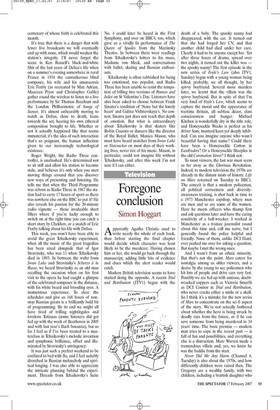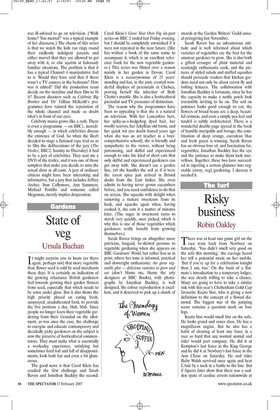Foregone conclusion
Simon Hoggart Apparently Agatha Christie used to write nearly the whole of each book, then before starting the final chapter would decide which character was least likely to be the murderer. Having chosen him or her, she would go back through the manuscript, adding little bits of evidence and clues which the alert reader would catch.
Modern British television seems to have started doing the opposite. A recent Trial and Retribution (ITV1) began with the death of a baby. The spooky nanny had disappeared, with the car. It turned out that she had forged her CV, and that another child had died under her care. Clearly it had to be anyone except her. Yet after three hours of drama, spread over two nights, it turned out the killer was — the spooky nanny! The first episode in the new series of Foyle's Law (also ITV1, Sunday) began with a young woman being killed, probably, we all thought, by her spivvy boyfriend. Several more murders later, we learnt that the villain was the spivvy boyfriend. But in spite of that I'm very fond of Foyle's Law, which seems to capture the mood and the appearance of wartime Britain, all subfusc decor, class consciousness and hunger. Michael Kitchen is wonderfully dry in the title role, and Honeysuckle Weeks is perfect as his driver Sam, mustard keen yet deeply inhibited. Can you imagine anyone who wasn't beautiful having that name? Could there have been a Honeysuckle Cotton in EastEnders? Or a Honeysuckle Sharples in the old Coronation Street? I think not.
To most viewers, the last war must seem as far away as the Glorious Revolution. Indeed, to modern television the 1970s are already in the distant mists of history. Life on Mars returned on Tuesday to BBC1. The conceit is that a modern policeman, all political correctness and diversityawareness training, is shot back in time to a 1973 Manchester copshop, where men are men and so are some of the women. Here he meets officers who thump first and ask questions later and have the caring sensitivity of a ball-wrecker. I worked in Manchester as a trainee journalist round about this time and, call me naive, but I generally found the police helpful and friendly. None of them, unlike DCI Hunt, ever pushed me over for asking a question. But maybe I met the wrong ones.
And I wasn't from an ethnic minority. But that's not the point. Mars caters for nostalgia among us older viewers, and a desire by the young to see policemen who hit lots of people and drive cars very fast. Possibly we are fed up with anxious, doubtwracked coppers such as Victoria Smurfit as DCI Connor in Trial and Retribution, who never cracks either a smile or a skull. So I think it's a mistake for the new series of Mars to concentrate on the sci-fi aspect of the story. We're not actually bothered about whether the hero is being struck by deadly rays from the future, or if he can save someone from being murdered in 34 years' time. The basic premise — modern man tries to cope in the recent past — is full of fun and possibilities, and everything else is a distraction. Marc Warren made a tremendous villain and, yes, we knew he was the baddie from the start.
Never Did Me Any Harm (Channel 4, Tuesday) is also about the 1970s, and how differently children were raised then. The Gregorys are a wealthy family, with two children, including a brattish daughter who was ill-advised to go on television. (Walk home? You mental?' was a typical example of her discourse.) The charm of this series is that we watch the kids run rings round their endlessly indulgent parents and either marvel that they are allowed to get away with it, or else squirm at hideously familiar situations. The problem is that it has a typical Channel 4 manipulative feel to it. Would they have said that if there wasn't a TV camera in the bedroom? How was it edited? Did the production team decide on the storyline and then film to fit it? Recent disasters such as Celebrity Big Brother and 'Dr' Gillian McKeith's programmes have tainted the reputation of the whole channel and made us doubt what's in front of our eyes.
Celebrity mania grows like a rash. There is even a programme — on BBC1, incredibly enough — in which celebrities discuss the existence of God. So when the Beeb decided to stage a fictional rape trial so as to film the deliberations of the jury (The Verdict, BBC2, Sunday to Thursday) it had to be a jury of celebrities. They sent me a DVD of the trailer, and it was one of those samplers that make you decide to miss the actual show at all costs. A jury of ordinary citizens might have been interesting and informative, but a jury that includes Jeffrey Archer, Stan Collymore, Ann Summers, Michael Portillo and someone called Megaman, merely implies desperation.


























































 Previous page
Previous page